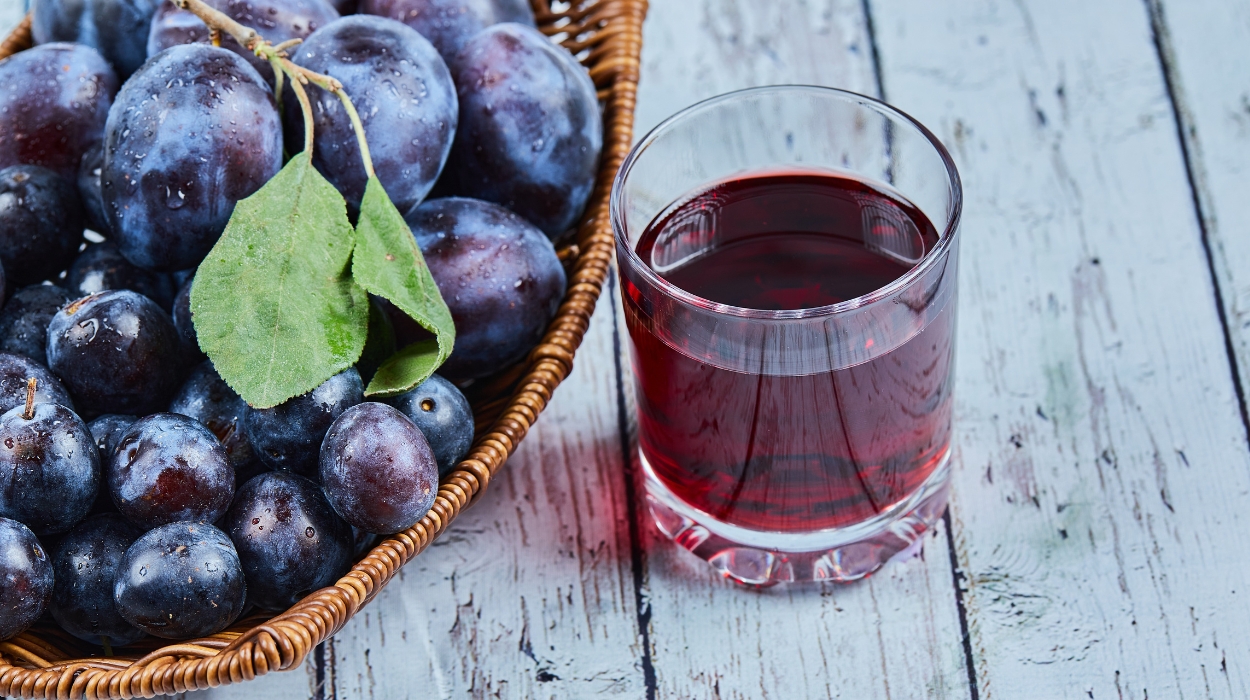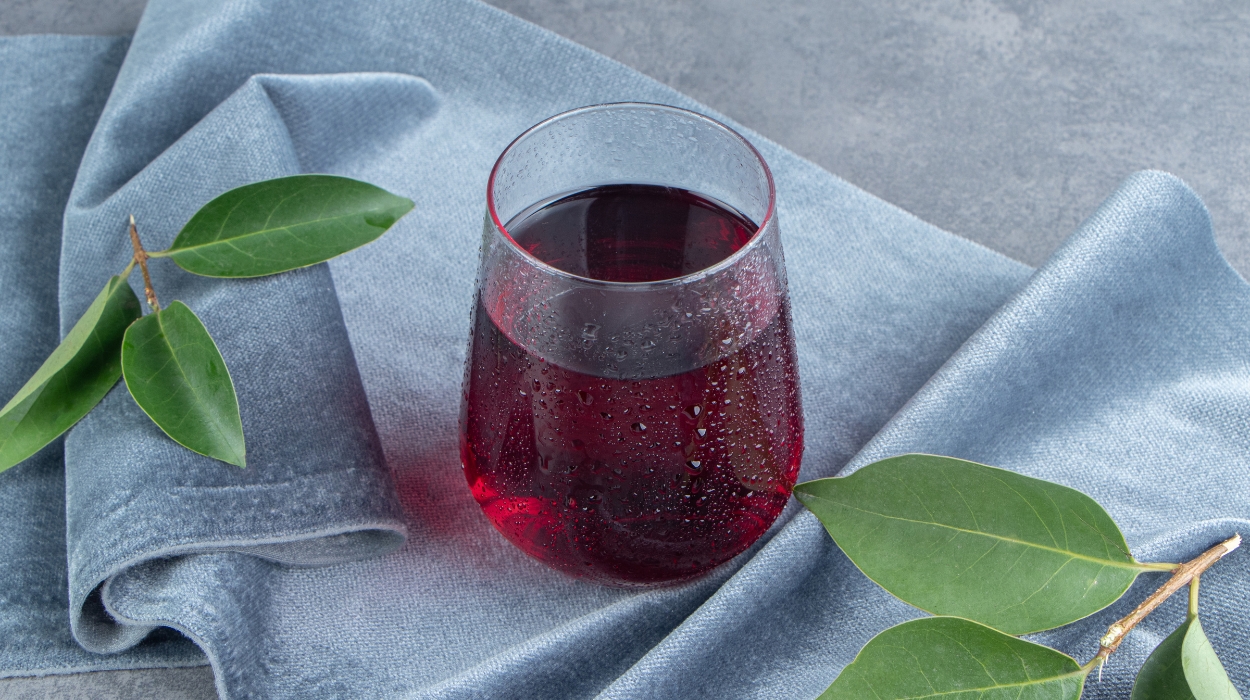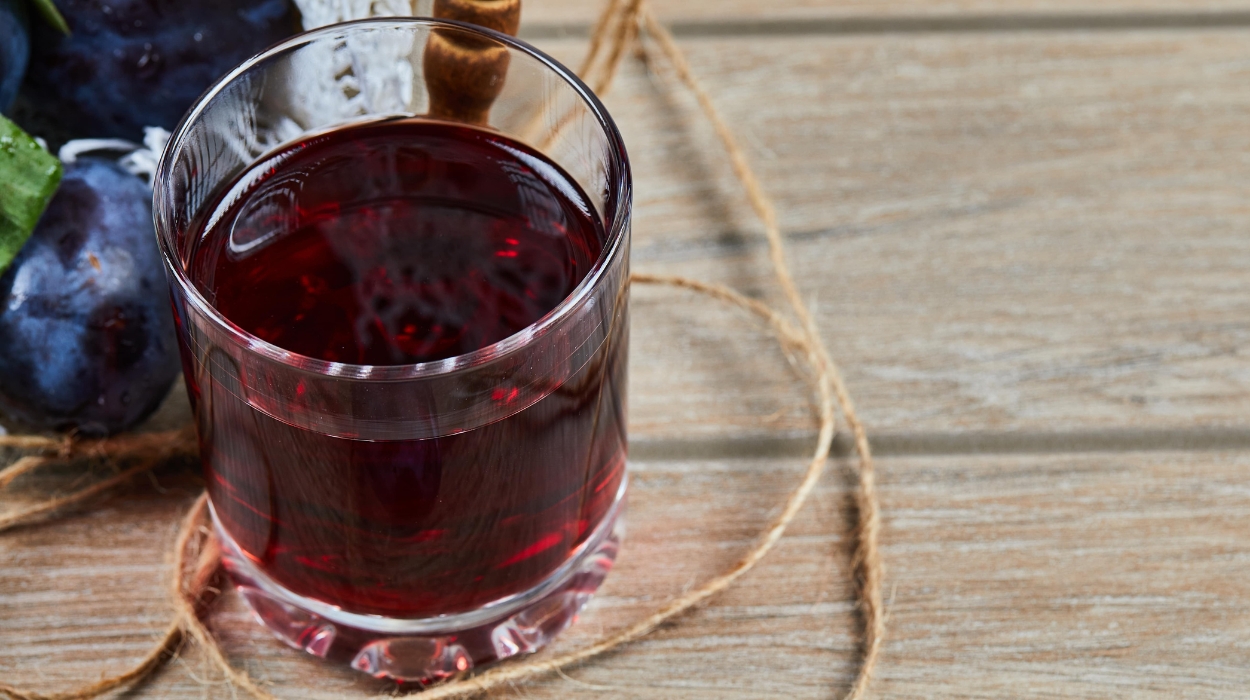 Expert's opinion
Expert's opinion
Expert's opinion
The article is a subjective view on this topic written by writers specializing in medical writing.
It may reflect on a personal journey surrounding struggles with an illness or medical condition, involve product comparisons, diet considerations, or other health-related opinions.
Although the view is entirely that of the writer, it is based on academic experiences and scientific research they have conducted; it is fact-checked by a team of degreed medical experts, and validated by sources attached to the article.
The numbers in parenthesis (1,2,3) will take you to clickable links to related scientific papers.
7 Prune Juice Benefits, Nutrition Facts & How To Use In 2024

Prune juice has been a popular home diet remedy for constipation for centuries. However, its potential health advantages have been extensively contested recently. So, it may be challenging to determine whether prune juice is healthy for you due to the wealth of contradictory information available online.
This systematic review article aims to answer the question: Is prune juice good for you?
We will explore the potential health benefits when you drink prune juice, including its health benefits with proven benefits for heart, bone, liver, digestion, and blood sugar health. We’ll also review its possible drawbacks, such as its high sugar content and potential adverse effects for individuals with certain health conditions.
By examining the latest research and expert opinions, we hope to provide a comprehensive and unbiased answer to this question and help you make informed decisions about incorporating prune juice into your diet.
Is Prune Juice Good For You?
Prune juice is good for you because it has many health benefits such as:
- Improves the digestive system.
- Supports heart health.
- Promotes bone health.
- Boosts immunity.
- Regulates blood sugar levels.
- Better liver function.
- May help with weight loss.
7 Prune Juice Benefits
Whenever you are contemplating buying or making your own prune juice, you should know the exact body systems that will benefit from you drinking the juice. Here are all the potential prune juice benefits:
Improves The Digestive System
Prune juice for constipation[1] is among the first benefits this fruit offers. Its excellent natural laxative effect is due to its high dietary fiber content, making it an effective remedy for treating constipation. The soluble fiber in prune juice naturally helps bulk up the stool, making it easier to pass through the digestive tract.
Additionally, sorbitol, a type of sugar alcohol found in prune juice can stimulate bowel movements and help prevent constipation.[2]
Supports Heart Health

Adding prune juice to your diet is good for the heart, as it is a good source of potassium. Potassium[3] is a mineral that helps regulate high blood pressure, reduce the hardening of blood vessels, and maintain overall heart health.
Studies have shown that potassium-rich foods[4] like prune juice can help decrease low-density lipoprotein cholesterol levels i.e. the “bad” cholesterol wading off any lingering cardiovascular disease.
Promotes Bone Health
Prune juice contains vitamin K, which is crucial to bone health. Vitamin K helps regulate calcium metabolism[5] and supports calcium absorption into bones, making them stronger and less susceptible to fractures.
It may also help improve bone markers that aid in preserving bone mineral density and preventing bone loss.
Bone marrow, which is the spongy tissue found in bones, is responsible for producing white and red blood cells. While prune juice does not directly affect bone marrow function, the nutrients in prune juice, such as vitamin K, can help support overall bone marrow health and function.
Boosts Immunity
Like most fruit juices, organic prune juice is rich in antioxidants,[6] which help protect the body against cell damage and disease. It may also facilitate faster wound healing.
The antioxidants in prune juice, such as phenolic compounds[7] and flavonoids,[8] can help boost the immune system and reduce the risk of chronic diseases.
Regulates Blood Sugar Levels
Prune juice, which has a low glycemic index, contains soluble fiber, which can help slow down the absorption of sugar[9] into the bloodstream.
A low glycemic index food simply refers to one with the least effect on blood sugar levels. This can help regulate blood sugar levels and prevent spikes in blood sugar.
Better Liver Function

Consuming prune juice may indirectly benefit liver health by promoting digestive health and reducing inflammation. By promoting regular bowel movements and reducing constipation, prune juice may help reduce the workload on the liver and improve overall liver function.
Prune juice contains antioxidants, such as phenolic compounds and flavonoids, with anti-inflammatory properties. While more research is needed, prune juice is generally considered a healthy beverage with numerous benefits to your liver health.
May Help With Weight Loss
Prune juice may aid in healthy weight loss by being low in calories, high in fiber, and slowing down carbohydrate absorption. The polyphenols in dried plums can also help reduce inflammation. Although it won’t cause significant weight loss, it can be a helpful addition to a healthy diet and exercise routine when consumed in moderation.
Prune Juice Nutrition Facts
Prune juice is made from dried European plums called Prunus domestica and has been touted as a natural remedy for chronic constipation, heart, liver, and digestive issues. But what specific essential nutrients does this drink have to offer?
Here is a closer look at all the prune juice nutrition facts:[10]
- Calories: One cup of prune juice, 250 milliliters, contains around 182 calories.
- Carbohydrates: It contains around 46 grams of carbohydrates, including three grams of fiber and 32 grams of sugar.
- Vitamins: Prune juice is rich in key vitamins such as vitamins C, K, and B6.
- Minerals: It contains potassium, iron, and magnesium minerals.
- Antioxidants: Prune juice is a good source of antioxidants, which can help protect the body against cell damage and disease.
- Sorbitol: Prune juice contains sorbitol, a natural laxative that can help alleviate constipation.
Risks And Side Effects
Although it has many health benefits, here are the potential health problems and side effects you should look for:
- Taking too many prunes or a lot of prune juice may lead to you consuming too much sugar, raising the risk of developing diabetes and blood sugar spikes.
- Consuming too much might cause diarrhea, bloating, and abdominal pain.
- Sorbitol, a type of sugar alcohol found in prune juice, can make you feel bloated and have gas.
- Some drugs, including blood thinners and iron supplements, can interact with prune juice negatively.
- Prune juice can cause weight gain and obesity if consumed in excess.
- Those with specific medical disorders, such as irritable bowel syndrome, i.e. IBS or fructose intolerance may be unable to consume prune juice.
- Consuming too much prune juice can cause electrolyte imbalances and dehydration.
- Prune juice may also cause allergic reactions in some people, particularly those allergic to plums or other stone fruits.
Before taking prune juice seek the advice of a registered dietitian to guide you on incorporating prunes into your diet healthily. Whether you seek it to ease mild constipation, improve overall gastrointestinal function, liver function, or overall health.
On another note, a registered dietitian also helps you find the best answers to questions like how much prune juice should I drink? How much prune juice is too much? And is prune juice good for pregnancy?
How To Add Prune Juice To Your Diet?
Adding prunes and prune juice to your diet is a simple way to incorporate the many health benefits of dried plums into your daily routine. Here are some ways to add prune juice to your diet:
- Drink a cup of prune juice daily: Drinking a cup each day is an easy way to incorporate the health benefits of dried plum polyphenols into your diet. Prune juice can be enjoyed alone or mixed with other juices for a tasty and nutritious beverage.
- Use prune juice as a natural sweetener: Instead of using sugar or artificial sweeteners in your recipes, try using prune juice as a natural sweetener. Prune juice can add flavor and moisture to baked goods and be used as a glaze for meats and vegetables.
- Add whole prunes to your diet: Eating prunes and drinking prunes in juice form are great ways to enjoy the health benefits of dried plums. Add whole prunes to your diet as a healthy snack or incorporate them into your meals. Whole prunes can be added to salads, oatmeal, and yogurt for flavor and nutrition.
- Use prune extracts in your cooking: Prune extracts, such as dried plum powder, can be added to smoothies, sauces, and marinades for an extra boost of nutrition. These extracts can also flavor potato chips, popcorn, and other snacks.
- Try the dried plum diet: The dried plum diet involves eating prunes and drinking prune juice as part of a healthy and balanced diet. It may improve digestive tract health and reduce inflammation. This dried plum diet protects and improves bone density.
Incorporating prune juice and dried fruit into your diet is an easy and delicious way to improve your health and well-being. However, consuming whole, dried, and prune juice in moderation is important due to its high sugar and high fiber content that may be unsafe or bothersome for some people.
The Bottom Line
Prune juice and dried plums may be the perfect fit if you want a healthy and delicious addition to your diet! With their numerous health benefits, including boosting the immune system, digestive health, and liver function, it’s no wonder these little fruits have been popular for centuries.
Consuming prunes may also help lower excess cholesterol levels reduce heart disease occurrence, aid in weight loss, reduce bone density loss, and prevent constipation. However, it’s important to consume these dried fruits and their juices or extracts in moderation due to their laxative effect, and sugar content, and to choose organic options when possible to avoid harmful chemicals.
By adding prune juice and dried plums to your diet, you can enjoy a tasty and nutritious way to support your overall health and well-being.
+ 10 sources
Health Canal avoids using tertiary references. We have strict sourcing guidelines and rely on peer-reviewed studies, academic researches from medical associations and institutions. To ensure the accuracy of articles in Health Canal, you can read more about the editorial process here
- Lever, E., Cole, J., Scott, S.M., Emery, P.W. and Whelan, K. (2014). Systematic review: the effect of prunes on gastrointestinal function. Alimentary Pharmacology & Therapeutics, [online] 40(7), pp.750–758. doi:https://doi.org/10.1111/apt.12913.
- Koyama, T., Nagata, N., Kengo Nishiura, Miura, N., Kawai, T. and Yamamoto, H. (2022). Prune Juice Containing Sorbitol, Pectin, and Polyphenol Ameliorates Subjective Complaints and Hard Feces While Normalizing Stool in Chronic Constipation: A Randomized Placebo-Controlled Trial. The American Journal of Gastroenterology, [online] 117(10), pp.1714–1717. doi:https://doi.org/10.14309/ajg.0000000000001931.
- Aburto, N.J., Hanson, S., Gutierrez, H., Hooper, L., Elliott, P. and Cappuccio, F.P. (2013). Effect of increased potassium intake on cardiovascular risk factors and disease: systematic review and meta-analyses. The BMJ, [online] 346(apr03 3), pp.f1378–f1378. doi:https://doi.org/10.1136/bmj.f1378.
- Nih.gov. (2019). Office of Dietary Supplements – Potassium. [online] Available at: https://ods.od.nih.gov/factsheets/Potassium-HealthProfessional/#:~:text=Sources%20of%20Potassium,-Food&text=Potassium%20is%20found%20in%20a,potassium%20%5B3%2C5%5D.
- Khalil, Z., Alam, B., Amir Reza Akbari and Sharma, H. (2021). The Medical Benefits of Vitamin K2 on Calcium-Related Disorders. Nutrients, [online] 13(2), pp.691–691. doi:https://doi.org/10.3390/nu13020691.
- Coppari, S., Mariastella Colomba, Fraternale, D., Brinkmann, V., Romeo, M., Bruno, M., Barbara Di Giacomo, Mari, M., Guidi, L., Ramakrishna, S., Ventura, N. and Maria Cristina Albertini (2021). Antioxidant and Anti-Inflammaging Ability of Prune (Prunus Spinosa L.) Extract Result in Improved Wound Healing Efficacy. Antioxidants, [online] 10(3), pp.374–374. doi:https://doi.org/10.3390/antiox10030374.
- Ding, S., Jiang, H. and Fang, J. (2018). Regulation of Immune Function by Polyphenols. Journal of immunology research, [online] 2018, pp.1–8. doi:https://doi.org/10.1155/2018/1264074.
- Pérez-Cano, F.J. and Castell, M. (2016). Flavonoids, Inflammation and Immune System. Nutrients, [online] 8(10), pp.659–659. doi:https://doi.org/10.3390/nu8100659.
- Msomi, N.Z., Erukainure, O.L. and Md. Shahidul Islam (2021). Suitability of Sugar Alcohols as Antidiabetic Supplements: A Review. Journal of Food and Drug Analysis, [online] 29(1), pp.1–14. doi:https://doi.org/10.38212/2224-6614.3107.
- Usda.gov. (2024). FoodData Central. [online] Available at: https://fdc.nal.usda.gov/fdc-app.html#/food-details/2344825/nutrients.



